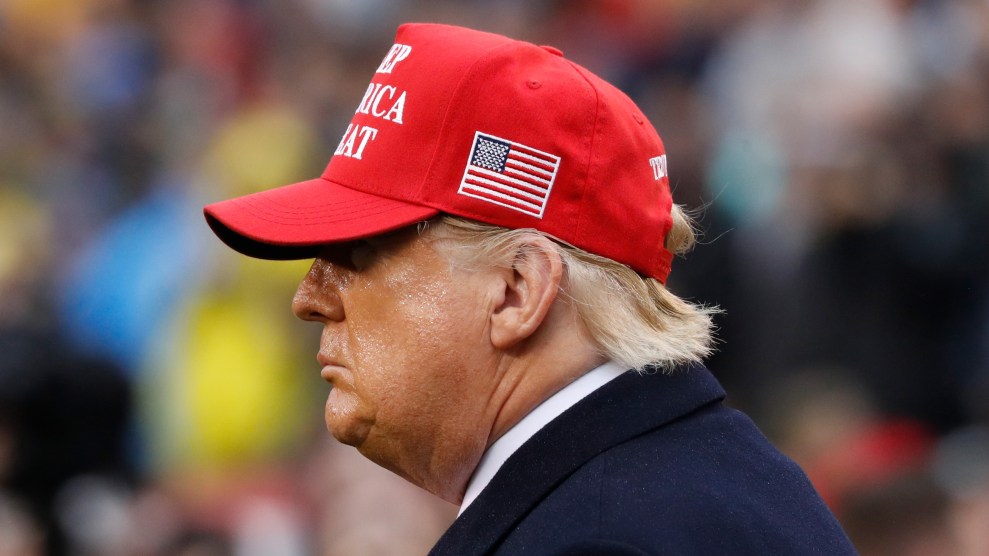
Jacquelyn Martin/AP
As the coronavirus pandemic continues to grip the world, so does another contagion, this one spread by political profiteers, opportunists, and grandstanders cashing in on a familiar trade. Whenever a bodily virus hits, a cultural virus tags along: the impulse to scapegoat an entire race, ethnicity, or nationality. “They did it” is the favorite refrain of fearmongers when contagion strikes, and the resulting violence is all too real. Partisan point-scoring is a predictable aspect of any outbreak, and the incentive is clear. A virus’s origin story is yours if you can frame it—especially if you can label it: the “Wuhan Virus.”
A Twitter fight and media shouting match have erupted over what to call this contagion after GOP Rep. Paul Gosar named it “Wuhan Virus” and got hammered for labeling it after the Chinese city where the coronavirus emerged. The battle over naming hasn’t stopped there. Republican lawmakers continue to fix blame by labeling it “Wuhan Virus,” “Chinese Coronavirus,” and “foreign virus,” ascribing fault to geography despite health experts’ insistence that these labels are inaccurate and dangerously divisive. On Thursday, Sen. Tom Cotton called it “Wuhan Virus” in announcing his DC office was closing just two days after the Centers for Disease Control and Prevention agreed with a reporter that it’s “absolutely wrong and inappropriate” to use that label—and Cotton was accused of lending credibility to the conspiracy theory that China released the coronavirus as a bioweapon.
As if on cue, as we were finalizing this column, Trump went full “Chinese Virus” on us:
The United States will be powerfully supporting those industries, like Airlines and others, that are particularly affected by the Chinese Virus. We will be stronger than ever before!
— Donald J. Trump (@realDonaldTrump) March 16, 2020
There’s a loud history of equating immigrants with disease, from the 1832 cholera outbreak, which was blamed on Irish Catholic immigrants, to the 1870s quarantining of San Francisco’s Chinatown residents following outbreaks of smallpox and other diseases presumed to spring from the neighborhood, setting the scene for the 1882 Chinese Exclusion Act.
But why resist an easy China did it! storyline when you’ve got an opportunity for shameless political posturing? China is a regular punching bag for a president who lays blame for all sorts of global ills at China’s door; he has already sparked a trade war with China, plunging any semblance of bilateralism to historic lows. Countless Republicans seem to see the coronavirus—uh, Wuhan Virus—as another Team Trump layup that they’re not gonna miss.
Never mind that the World Health Organization and CDC agree that the virus is “the coronavirus” and that everyone should “ensure accurate and fair” reporting, as the Asian American Journalists Association says, by reducing social stigma. “Stigma occurs when people negatively associate an infectious disease with a specific population,” WHO announced. “People are being labelled, stereotyped, separated and/or experience loss of status and discrimination because of a potential negative affiliation with #COVID19.”
China is in the crosshairs this time, but in living memory other regions have had their turns: An A/Singapore/INFIMH-16-0019/2016 A(H3N2)–like virus got shortened to “Singapore virus.” A B/Yamagata virus got shortened to “Yamagata virus,” after the city in Japan. There’s the “Spanish Flu.” The “Middle East Respiratory Syndrome” (MERS).
To anyone remotely interested in scientific literacy and media transparency—and the reduction of scapegoating and vilification during this pandemic—a bookmarkable tip from Mother Jones’ style guide:
The coronavirus, officially SARS-CoV-2, is a virus, not a disease, and the disease it causes is COVID-19 (or coronavirus disease), deriving from CO(rona) VI(rus) D(isease)-(20)19. COVID-19 is also called “the coronavirus disease.” It’s not accurate to say “the virus COVID-19” (that’s the disease). Phrases to keep on hand: “COVID-19, the disease caused by the coronavirus”; “the coronavirus, which causes COVID-19.”













